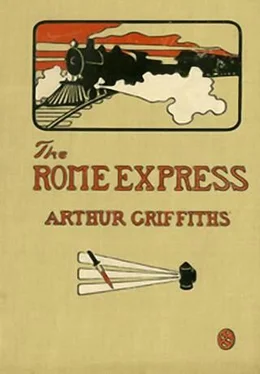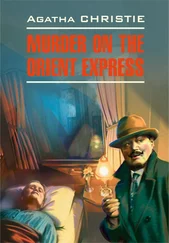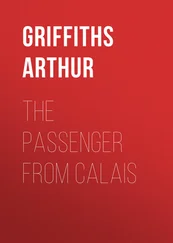Arthur Griffiths - The Rome Express
Здесь есть возможность читать онлайн «Arthur Griffiths - The Rome Express» весь текст электронной книги совершенно бесплатно (целиком полную версию без сокращений). В некоторых случаях можно слушать аудио, скачать через торрент в формате fb2 и присутствует краткое содержание. Жанр: Детектив, на английском языке. Описание произведения, (предисловие) а так же отзывы посетителей доступны на портале библиотеки ЛибКат.
- Название:The Rome Express
- Автор:
- Жанр:
- Год:неизвестен
- ISBN:нет данных
- Рейтинг книги:3 / 5. Голосов: 1
-
Избранное:Добавить в избранное
- Отзывы:
-
Ваша оценка:
- 60
- 1
- 2
- 3
- 4
- 5
The Rome Express: краткое содержание, описание и аннотация
Предлагаем к чтению аннотацию, описание, краткое содержание или предисловие (зависит от того, что написал сам автор книги «The Rome Express»). Если вы не нашли необходимую информацию о книге — напишите в комментариях, мы постараемся отыскать её.
The Rome Express — читать онлайн бесплатно полную книгу (весь текст) целиком
Ниже представлен текст книги, разбитый по страницам. Система сохранения места последней прочитанной страницы, позволяет с удобством читать онлайн бесплатно книгу «The Rome Express», без необходимости каждый раз заново искать на чём Вы остановились. Поставьте закладку, и сможете в любой момент перейти на страницу, на которой закончили чтение.
Интервал:
Закладка:
"The Colonel is now in the Chancery: will not monsieur wait?" asked the porter, with superb civility.
But the detective would not suffer this, and interposed, answering abruptly for Sir Charles: "No. It is impossible. We are going to the Quai l'Horloge. It is an urgent matter."
The porter knew what the Quai l'Horloge meant, and he guessed intuitively who was speaking. Every Frenchman can recognise a police officer, and has, as a rule, no great opinion of him.
"Very well!" now said the porter, curtly, as he banged the wicket-gate on the retreating cab, and he did not hurry himself in giving the card to Colonel Papillon.
"Does this mean that I am a prisoner?" asked Sir Charles, his gorge rising, as it did easily.
"It means, monsieur, that you are in the hands of justice until your recent conduct has been fully explained," said the detective, with the air of a despot.
"But I protest-"
"I wish to hear no further observations, monsieur. You may reserve them till you can give them to the right person."
The General's temper was sorely ruffled. He did not like it at all; yet what could he do? Prudence gained the day, and after a struggle he decided to submit, lest worse might befall him.
There was, in truth, worse to be encountered. It was very irksome to be in the power of this now domineering little man on his own ground, and eager to show his power. It was with a very bad grace that Sir Charles obeyed the curt orders he received, to leave the cab, to enter at a side door of the Prefecture, to follow this pompous conductor along the long vaulted passages of this rambling building, up many flights of stone stairs, to halt obediently at his command when at length they reached a closed door on an upper story.
"It is here!" said M. Flocon, as he turned the handle unceremoniously without knocking. "Enter."
A man was seated at a small desk in the centre of a big bare room, who rose at once at the sight of M. Flocon, and bowed deferentially without speaking.
"Baume," said the Chief, shortly, "I wish to leave this gentleman with you. Make him at home,"-the words were spoken in manifest irony,-"and when I call you, bring him at once to my cabinet. You, monsieur, you will oblige me by staying here."
Sir Charles nodded carelessly, took the first chair that offered, and sat down by the fire.
He was to all intents and purposes in custody, and he examined his gaoler at first wrathfully, then curiously, struck with his rather strange figure and appearance. Baume, as the Chief had called him, was a short, thick-set man with a great shock head sunk in low between a pair of enormous shoulders, betokening great physical strength; he stood on very thin but greatly twisted bow legs, and the quaintness of his figure was emphasised by the short black blouse or smock-frock he wore over his other clothes like a French artisan.
He was a man of few words, and those not the most polite in tone, for when the General began with a banal remark about the weather, M. Baume replied, shortly: "I wish to have no talk;" and when Sir Charles pulled out his cigarette-case, as he did almost automatically from time to time when in any situation of annoyance or perplexity, Baume raised his hand warningly and grunted: "Not allowed."
"Then I'll be hanged if I don't smoke in spite of every man jack of you!" cried the General, hotly, rising from his seat and speaking unconsciously in English.
"What's that?" asked Baume, gruffly. He was one of the detective staff, and was only doing his duty according to his lights, and he said so with such an injured air that the General was pacified, laughed, and relapsed into silence without lighting his cigarette.
The time ran on, from minutes into nearly an hour, a very trying wait for Sir Charles. There is always something irritating in doing antechamber work, in kicking one's heels in the waiting-room of any functionary or official, high or low, and the General found it hard to possess himself in patience, when he thought he was being thus ignominiously treated by a man like M. Flocon. All the time, too, he was worrying himself about the Countess, wondering first how she had fared; next, where she was just then; last of all, and longest, whether it was possible for her to be mixed up in anything compromising or criminal.
Suddenly an electric bell struck in the room. There was a table telephone at Baume's elbow; he took up the handle, put the tube to his mouth and ear, got his message answered, and then, rising, said abruptly to Sir Charles: "Come."
When the General was at last ushered into the presence of the Chief of the Detective Police, he found to his satisfaction that Colonel Papillon was also there, and at M. Flocon's side sat the instructing judge, M. Beaumont le Hardi, who, after waiting politely until the two Englishmen had exchanged greetings, was the first to speak, and in apology.
"You will, I trust, pardon us, M. le General, for having detained you here and so long. But there were, as we thought, good and sufficient reasons. If those have now lost some of their cogency, we still stand by our action as having been justifiable in the execution of our duty. We are now willing to let you go free, because-because-"
"We have caught the person, the lady you helped to escape," blurted out the detective, unable to resist making the point.
"The Countess? Is she here, in custody? Never!"
"Undoubtedly she is in custody, and in very close custody too," went on M. Flocon, gleefully. " Au secret , if you know what that means-in a cell separate and apart, where no one is permitted to see or speak to her."
"Surely not that? Jack-Papillon-this must not be. I beg of you, implore, insist, that you will get his lordship to interpose."
"But, sir, how can I? You must not ask impossibilities. The Contessa Castagneto is really an Italian subject now."
"She is English by birth, and whether or no, she is a woman, a high-bred lady; and it is abominable, unheard-of, to subject her to such monstrous treatment," said the General.
"But these gentlemen declare that they are fully warranted, that she has put herself in the wrong-greatly, culpably in the wrong."
"I don't believe it!" cried the General, indignantly. "Not from these chaps, a pack of idiots, always on the wrong tack! I don't believe a word, not if they swear."
"But they have documentary evidence-papers of the most damaging kind against her."
"Where? How?"
"He-M. le Juge-has been showing me a note-book;" and the General's eyes, following Jack Papillon's, were directed to a small carnet , or memorandum-book, which the Judge, interpreting the glance, was tapping significantly with his finger.
Then the Judge said blandly, "It is easy to perceive that you protest, M. le General, against that lady's arrest. Is it so? Well, we are not called upon to justify it to you, not in the very least. But we are dealing with a brave man, a gentleman, an officer of high rank and consideration, and you shall know things that we are not bound to tell, to you or to any one."
"First," he continued, holding up the note-book, "do you know what this is? Have you ever seen it before?"
"I am dimly conscious of the fact, and yet I cannot say when or where."
"It is the property of one of your fellow travellers-an Italian called Ripaldi."
"Ripaldi?" said the General, remembering with some uneasiness that he had seen the name at the bottom of the Countess's telegram. "Ah! now I understand."
"You had heard of it, then? In what connection?" asked the Judge, a little carelessly, but it was a suddenly planned pitfall.
"I now understand," replied the General, perfectly on his guard, "why the note-book was familiar to me. I had seen it in that man's hands in the waiting-room. He was writing in it."
"Indeed? A favourite occupation evidently. He was fond of confiding in that note-book, and committed to it much that he never expected would see the light-his movements, intentions, ideas, even his inmost thoughts. The book-which he no doubt lost inadvertently is very incriminating to himself and his friends."
Читать дальшеИнтервал:
Закладка:
Похожие книги на «The Rome Express»
Представляем Вашему вниманию похожие книги на «The Rome Express» списком для выбора. Мы отобрали схожую по названию и смыслу литературу в надежде предоставить читателям больше вариантов отыскать новые, интересные, ещё непрочитанные произведения.
Обсуждение, отзывы о книге «The Rome Express» и просто собственные мнения читателей. Оставьте ваши комментарии, напишите, что Вы думаете о произведении, его смысле или главных героях. Укажите что конкретно понравилось, а что нет, и почему Вы так считаете.












